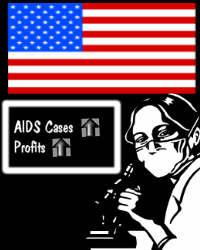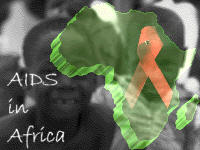 |


|
|
& Developing Countries |
|
By John S. James
Worldwide, about 90% of people with HIV live in developing countries and have no access to modern pharmaceuticals, which often cost more than $10,000 per year; the situation is similar for many other serious illnesses including cancer and drug-resistant tuberculosis. Until recently, U.S. policy was almost totally captive to the pharmaceutical industry--which cares little about marketing drugs in developing countries, since there is little money there, but cares very much about avoiding any precedent, anywhere, which might weaken its intellectual-property protection in the U.S. or other lucrative markets. Many drugs could sell for a tenth or less their current prices if it were not for patent restrictions. The result is that U.S. policy stood firmly in the way of 20 million people with HIV in Africa alone who are facing death- -cutting them off from any hope of medical care which could extend or save their lives. Today, after high-profile protests directed mostly against presidential candidate Al Gore (the major custodian of this U.S. policy toward the Union of South Africa, which has taken the lead in resisting it), the U.S. has moderated its aggressiveness against that country's efforts to expand access to medicine to more of its citizens (when allowed within WTO rules). But this change applies to South Africa only, so protests are continuing--for example, the October 6 demonstration in Washington D.C. against U.S. Trade Representative Charlene Barshefsky, with 14 arrests-- organized by ACT UP/Philadelphia and others. Capsule History
But the WTO treaty does include some safeguards--for example, "compulsory licensing," which recognizes the right of a sovereign government to license use of a patent within its borders on terms set by the government (subject to review by the WTO). Therefore most of the protest so far on this issue has not been against the WTO, but against U.S. policy which has gone well beyond the WTO treaty in supporting the pharmaceutical industry's claim that its intellectual property interests come first, before anyone's heath needs. Some are concerned that industry might try to take away safeguards during the next round of world trade negotiations, beginning at the November 29--December 3 world trade ministers' meeting in Seattle.
Industry argues that without strong patent protection, there will be no incentives to develop new drugs. In fact, industry does much less medical research than generally believed. But also, when a patient cannot obtain needed drugs at all, no royalty is generated and no research is supported, since no sale takes place. There must be a better way to support medical research than condemning 90% of people who need a drug to death, just to maintain high prices for the other 10%. On May 6 of the year, Bristol-Myers Squibb Company announced that it had committed $100,000,000 to a five-year program to improve AIDS research and treatment in five African countries. We commended them for initiating this program, when most companies do not care. But it's also worth noting that even if this program works perfectly, it will deliver treatment to no more than 20,000 people--less than one in a thousand Africans living with HIV. The point is that while charitable projects are vital, charity alone cannot treat a whole continent. We also need rules and arrangements (including trade rules) that everyone can live with. What Organizers Can Learn from This Issue Less than a year ago, the issue of pharmaceutical patents and developing countries was nowhere on the radar screen in the U.S.; fewer than a handful of organizers in the whole country were working on it, and almost no one had ever heard about the issue or considered it at all. There was essentially no coverage in any mainstream, specialized, or alternative media. We expected a slow building of momentum through progressive organizations and churches, until eventually there could be mainstream attention. Instead, the issue has moved so fast into the mainstream that there was little time to even inform the progressive community about it. What worked was:
(2) Technical expertise. Here it was provided mainly by some of the Ralph Nader organizations, especially the Consumer Project on Technology (www.cptech.org). (3) High-profile protests. AIDS activists who confronted Gore in his campaign brought the issue to national attention. (4) The unpopularity of the pharmaceutical industry. (5) Some good luck. Washington insiders thought this issue had no chance. It has long been fundamental U.S. foreign and economic policy to protect the intellectual property rights of its companies-- with no institutional commitment to avoid killing people in the process. Few thought the public would care much about a complex trade dispute--or about African lives. Recently when activists went to talk to Congressional aides on Capitol Hill, they found that regardless of ideology, the aides at least knew what this issue was--a striking contrast to most AIDS and other issues for which far more legislative work has been done. What has been accomplished in the last six months is to put this issue on the table, when it was not on the table before. Thousands of journalists, activists, politicians, and trade or foreign-policy experts in the U.S. and around the world now know the problem exists, and some are researching, writing, or otherwise working with it. The Future We believe the main focus should be on the central moral issue, rather than on a specific remedy. At the very least, government policy should not create impossible obstacles to saving lives and improving health care around the world. We are looking for workable ideas from any source, certainly including industry. For More Information
[John S. James has published AIDS TREATMENT NEWS for over 12 years. He can be reached at jjames@aidsnews.org or 415-861-2432.] AIDS Treatment News Published twice monthly Subscription and Editorial Office: P.O. Box 411256 San Francisco, CA 94141 800/TREAT-1-2 toll-free U.S. and Canada 415/255-0588 regular office number Fax: 415/255-4659 E-mail: aidsnews@aidsnews.org
Editor and Publisher: John S. James Associate Editor: Tadd T. Tobias Reader Services: Tom Fontaine and Denny Smith Operations Manager: Danalan Richard Copeland Statement of Purpose: AIDS Treatment News reports on experimental and standard treatments, especially those available now. We interview physicians, scientists, other health professionals, and persons with AIDS or HIV; we also collect information from meetings and conferences, medical journals, and computer databases. Long-term survivors have usually tried many different treatments, and found combinations which work for them. AIDS Treatment News does not recommend particular therapies, but seeks to increase the options available. Subscription Information: Call 800/TREAT-1-2 Businesses, Institutions, Professionals: $270/year. Includes early delivery of an extra copy by email. Nonprofit organizations: $135/year. Includes early delivery of an extra copy by email. Individuals: $120/year, or $70 for six months. Special discount for persons with financial difficulties: $54/year, or $30 for six months. If you cannot afford a subscription, please write or call. Outside North, Central, or South America, add air mail postage: $20/year, $10 for six months. Back issues available. Fax subscriptions, bulk rates, and multiple subscriptions are available; contact our office for details. Please send U.S. funds: personal check or bank draft, international postal money order, or travelers checks. ISSN # 1052-4207 Copyright 1999 by John S. James. |

© 1997-98 BEI
 Over 12,000,000 people in Africa alone have already died of
AIDS, and 20,000,000 more in Africa are now living with HIV,
according to generally accepted estimates.
Over 12,000,000 people in Africa alone have already died of
AIDS, and 20,000,000 more in Africa are now living with HIV,
according to generally accepted estimates.
 United States Trade Representative Charlene Barshefsky
United States Trade Representative Charlene Barshefsky  (1) The strategy and goal of developing a world-class moral
issue--modeled in some ways on the anti-apartheid movement,
and on the movement to stop the U.S. from forcing other
countries to accept the mass marketing of tobacco. Above all,
the moral issue had to be clear and immediately
understandable to people.
(1) The strategy and goal of developing a world-class moral
issue--modeled in some ways on the anti-apartheid movement,
and on the movement to stop the U.S. from forcing other
countries to accept the mass marketing of tobacco. Above all,
the moral issue had to be clear and immediately
understandable to people.